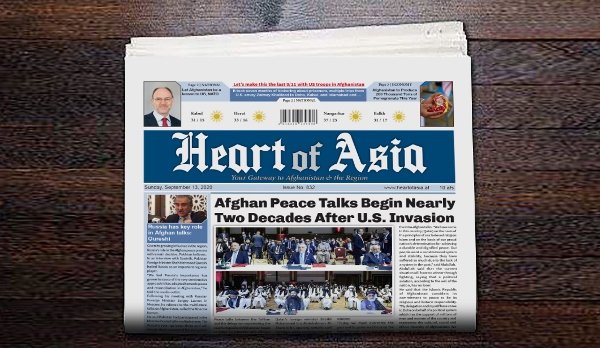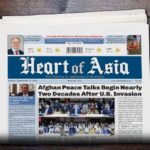Peace talks between the Taliban and the delegation representing the Islamic Republic of Afghanistan began in Qatar on Saturday with officials from many nations and international organizations attending or speaking virtually at the opening ceremony.
Officials from Qatar, the U.S., Norway, Turkmenistan, China, Indonesia, Uzbekistan, Turkey, Germany, Pakistan, India, Iran, Spain, Finland, UK, Japan, the UN, NATO And the Organization of Islamic Cooperation (OIC) gave opening remarks.
Qatar’s foreign minister Sheikh Mohammed bin Abdulrahman Al-Thani in his opening remarks said that there will be no military solution to the conflict in Afghanistan.
“History has taught us that military force cannot decide any conflict in Afghanistan and that the only means to that end is an immediate and permanent ceasefire and opening the way for a constructive dialogue through the negotiations table to reach a comprehensive political settlement,” said the Qatari foreign minister.
“Today we must overcome the past and its pains and focus on the future,” he said, stating that all Afghan factions should come together and seize the opportunity and work for the interests of Afghanistan.
Abdullah Abdullah:
Abdullah Abdullah, the head of the High Council of National Reconciliation, during his opening remarks said that all Afghans have a desire for peace. Abdullah also thanked the Taliban for engaging in the intra-Afghan talks. “We have come to this country (Qatar) on the basis of the principles of our beloved religion Islam and on the basis of our proud nation’s determination for achieving a durable and dignified peace. Our people want a constitutional system and stability, because they have suffered so much due to the lack of a system in the past,” said Abdullah.
Abdullah said that the current situation will have no winner through fighting, saying that a political solution, according to the will of the nation, has no loser.
He said that the Islamic Republic of Afghanistan considers its commitment to peace to be its religious and historic responsibility. “My delegation and myself have come to Doha on behalf of a political system which has the support of millions of men and women of the country and represents the cultural, social and ethnic diversity of Afghanistan. We are here to figure out a process that will close the door of war forever and open the door of coexistence and peaceful life for our citizens,” Abdullah said.
“We have come here with good intentions to achieve lasting peace and for honest negotiations and to engage in discussions to reach a comprehensive agreement between the two sides,” said Abdullah.
“We want the Afghan people to again live under a unified roof after 42 years of ups and downs, aggression, jihad and resistance,” said Abdullah.
Abdullah also said: “Ladies and gentlemen, I assure you that the delegation of the Islamic Republic of Afghanistan has come to Qatar to negotiate on behalf of all political factions and various layers of the society.”
Abdullah said that there have been tremendous changes in the lives of the Afghan people over the past years and that a return to the past will not be acceptable to the Afghan people.
“The Constitution of the Islamic Republic of Afghanistan, democracy, elections, press freedom, women’s rights, the rights of minorities, rule of law, civil rights and human rights are among the major gains the Afghan people have achieved so far,” said Abdullah.
“We believe that there will be no need for the presence of foreign forces in the country if there is a peace,” concluded Abdullah.
United States
U.S. Secretary of Mike Pompeo, speaking at the event, said that today is a truly momentous occasion as Afghans have at long last chosen to sit together and chart a new course for your country. “This is a moment to dare to hope,” he said.
“As we look toward the light, we recall the darkness of four decades of war, and the lost lives and opportunities. But it is remarkable — and a testament to the human spirit — that the pain and patterns of destruction are no match for the enduring hopes for peace held by the Afghan people, and their many friends,” said Pompeo.
Pompeo said that the U.S. will never forget the September 11 attack, but said that Washington welcomes the Taliban commitment to not host international terrorist groups, including al-Qaeda, nor to allow them to use Afghan territory to train, recruit, or fundraise.
” We welcome the same commitments by the Government of the Islamic Republic. Afghanistan should never again serve as a base for international terrorists to threaten other countries,” said Pompeo.
Pompeo said: “It took hard work and sacrifice to reach this moment, and it will require hard work and sacrifice to keep it alive, and to take advantage of it so that the talks result in a durable peace.”
“The entire world wants you to succeed.” Pompeo said.
“I urge you to engage the representatives of all Afghan communities — including women, ethnic and religious minorities, and the victims of your country’s long war,” said Pompeo.
“These historic negotiations should produce a political arrangement that accommodates competing views and rejects the use of violence to achieve political aims,” concluded Pompeo.
Pakistan
Speaking at the event, Pakistani Foreign Minister Shah Mahmood Qureshi said that today is a historic occasion as Afghans take a major step forward in their long quest for peace.
“A new dawn is upon us,” said Qureshi.
Qureshi said “Pakistan has fully facilitated the process that culminated in the U.S.-Taliban Peace Agreement in Doha on February 29, 2020 and has reached this juncture,” Qureshi said.
Qureshi said that Pakistan has long maintained that there is no military solution to the conflict in Afghanistan. A political solution is the only way forward.
“It is now for the Afghan leaders to seize this historic opportunity, work together constructively, and secure an inclusive, broad-based and comprehensive political settlement,” he said.
Qureshi warned that spoilers, from within and from without, will pose formidable challenges.
“At this historic juncture, it is imperative that the mistakes of the past are not repeated. The Afghan people must not be abandoned, as happened before. The progress achieved must not be frittered away,” added Qureshi.
Norway
Ine Marie Eriksen Søreide, the Norwegian minister of foreign affairs at the event said that today is a day of hope for all who share the goal of finding an end to Afghanistan’s four decades of conflict.
“In order to get to the table, you have made difficult decisions, compromises, and sacrifices. Thousands of prisoners have been released as a confidence-building measure,” she said.
“I hope that a spirit of compromise and flexibility on all sides will be present throughout the negotiations,” the Norwegian foreign minister said.
She said that the inclusion of women, victims, minorities and other stakeholders in the peace process is important to ensure ownership and the successful implementation of a future peace accord.
Taliban
Mullah Abdul Ghani Baradar, the head of the Taliban’s political office in Doha. in speech said that the Taliban assures the Afghan people that it will take part in the intra-Afghan negotiations with the spirit of honesty so that peace and stability can prevail for the Afghan people.
“We also assure the world that the Taliban will use all their ability so that the intra-Afghan talks get positive results,” said Mullah Baradar.
He also called on the U.S. to comply with its commitments under the U.S.-Taliban peace agreement.
“The peace negotiation process will have some challenges, but we need to show courage if we face issues during the talks and move forward with patience,” Baradar said.
Organization of Islamic Cooperation (OIC)
Dr. Yousef A. Al-Othaimeen, the chairman of the Organization of Islamic Cooperation (OIC), said that the organization strongly supports the peace process in Afghanistan, stating that over the last one and a half years, OIC has asked all Afghan stakeholders to engage in dialogue.













